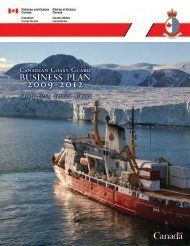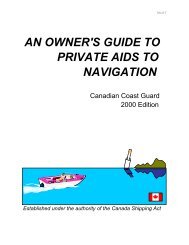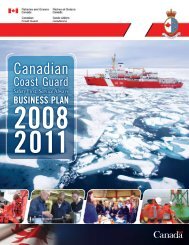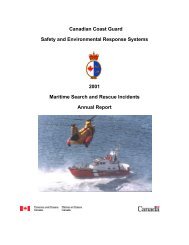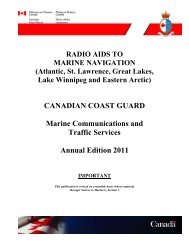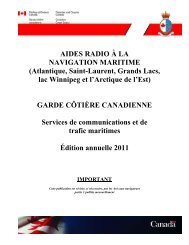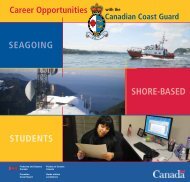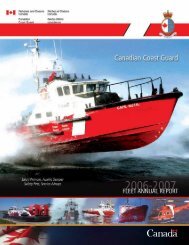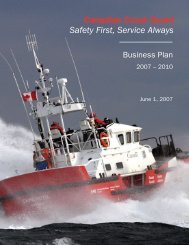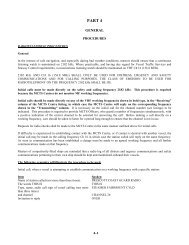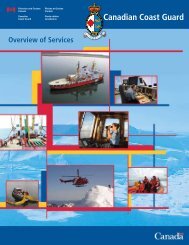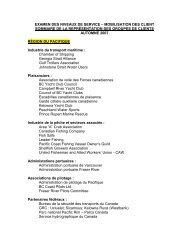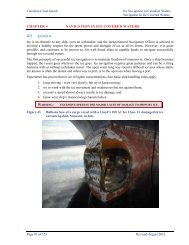RADIO AIDS TO MARINE NAVIGATION - Canadian Coast Guard
RADIO AIDS TO MARINE NAVIGATION - Canadian Coast Guard
RADIO AIDS TO MARINE NAVIGATION - Canadian Coast Guard
You also want an ePaper? Increase the reach of your titles
YUMPU automatically turns print PDFs into web optimized ePapers that Google loves.
CELLULAR TELEPHONE (*16) SERVICE – <strong>MARINE</strong> EMERGENCIES<br />
MCTS Centres in certain parts of Canada are connected to the cellular telephone network system where cellular telephone<br />
users can, in an emergency situation only, dial *16 or #16 (dependant upon the service provider) on their telephone to<br />
access an MCTS Centre in order to obtain assistance.<br />
Mariners are cautioned that a cellular telephone is not a good substitute for a marine radio because the maritime mobile<br />
radio safety system in the southern waters of Canada is based principally on VHF communications. VHF has the<br />
advantage that a call can be heard by the closest MCTS Centre(s) and by ships in the vicinity which could provide<br />
immediate assistance. On the other hand, the telephone cellular network is a party-to-party system and the benefit of the<br />
broadcast mode in an emergency situation cannot be obtained.<br />
Mariners are reminded that the use of marine radio distress frequencies to obtain assistance in an emergency situation is the<br />
best option and that cellular telephone should be used only as an alternative should the VHF radiotelephone set not be<br />
available. Standard distress alerting equipment, such as marine radio and EPIRBs should never be replaced by cellular<br />
telephone alone.<br />
Note: Details of this service may be obtained by contacting local cellular telephone companies; however, mariners are<br />
cautioned that not all cellular telephone companies provide this service.<br />
DIRECTION FINDING (DF) SERVICE<br />
MCTS Centres in certain parts of Canada are provided with VHF/DF equipment, primarily to determine or confirm the<br />
bearing, from a DF facility, of a vessel requiring assistance in a distress or other emergency situation. In addition, an<br />
estimated line of position from a DF facility can be provided to vessels that are uncertain of their locations. Location of<br />
VHF/DF facilities will be found in the appropriate Centre listings in Part 2 of this publication. The intent of this service is<br />
not to provide a navigation service. Positions must be regarded as estimates only. Mariners are cautioned that any<br />
information provided shall be used at their own discretion.<br />
Direction Finding Bearings<br />
Any MCTS Centre will, on request, transmit signals that will enable a ship to take a radio bearing with its own direction<br />
finder. It is pointed out to masters of ships fitted with direction finding equipment employing DF loops that serious error<br />
may result in bearings taken if metallic material or equipment (poles, wires, winches, etc.) are erected in proximity to the<br />
DF antenna equipment after calibration.<br />
Masters of ships are urged to exercise caution in the use of commercial radio broadcasting stations as radio beacons.<br />
Bearings taken on such stations may be very inaccurate owing to errors caused by coastal refraction and the calibration of<br />
the Direction Finder employed may vary considerably due to the wide difference in frequencies used, (i.e. the standard<br />
broadcast band spreads over approximately 1060 kHz). In addition, it is advisable to make certain that the position of the<br />
broadcast transmitter (not the studio) is accurately known before using it as a navigation aid.<br />
SAIL PLAN SERVICE<br />
All small craft operators, including those making day trips, are encouraged to file a Sail Plan with a responsible person.<br />
This person should be instructed to call the Joint Rescue Coordination Centre (JRCC) if the vessel becomes overdue. (The<br />
telephone number can be found at the front of most telephone books, and should be included with the Sail Plan). In<br />
circumstances where it is not possible to file a Sail Plan with a responsible person, a Sail Plan may be filed by telephone,<br />
radio or in person with any <strong>Coast</strong> <strong>Guard</strong> MCTS Centre. While at sea, masters/operators who have filed a sail plan with an<br />
MCTS Centre are encouraged to file a daily position report during long trips. Upon your return, be sure to close (or<br />
deactivate) the sail plan you filed earlier. Forgetting to do so can result in an unwarranted search for you.<br />
4-36



